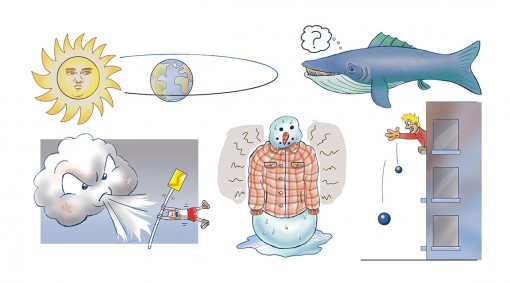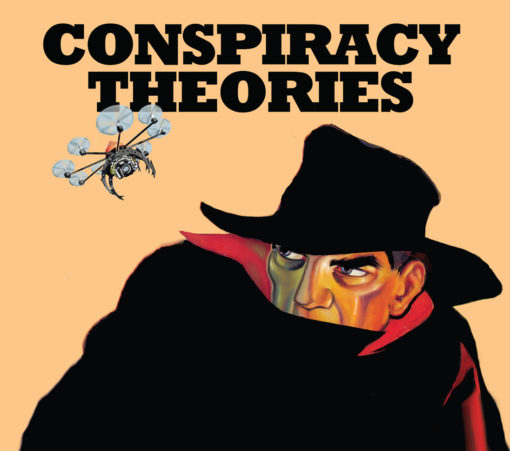What does it mean to be radicalized? Why can’t we wage a war on extremists? Why can’t we just embrace the moderates to counter extremists? In this week’s eSkeptic, investigative journalist Tina Dupuy proposes the need to re-think the fight against extremists as she examines some backward reasoning about our innate desire to get back to paradise.
Tags
-
browse by topic
belief
Once Upon a Time: Re-Thinking the Fight Against Extremists
eSkeptic for December 30, 2015
What does it mean to be radicalized? Why can’t we wage a war on extremists? Why can’t we just embrace the moderates to counter extremists? In this week’s eSkeptic, investigative journalist Tina Dupuy proposes the need to re-think the fight against extremists as she examines some backward reasoning about our innate desire to get back to paradise.
The Top 10 Weirdest Things

Ever since Michael Shermer wrote Why People Believe Weird Things he has been asked to list the strangest beliefs he’s come across in his quarter century as a professional skeptic. We have compiled this list into The Top 10 Weirdest Things… DOWNLOAD the free PDF
I Don’t Know What You Mean

Daniel Loxton describes recent research "On the Reception and Detection of Pseudo-Profound Bullshit," and reflects on the communications chasm that can exist between skeptics and believers.
Science v. Intuition: Why is it Difficult for Scientific Knowledge to Take Root?

How is it that naïve intuitions can survive the acquisition of contradictory scientific knowledge? Andrew Shtulman discusses the psychological concepts of knowledge enrichment and conceptual change, inquiring into why it is so difficult for scientific knowledge to take root, and whether scientific knowledge can overwrite deep-seated forms of intuition.
eSkeptic for November 4, 2015
How is it that naïve intuitions can survive the acquisition of contradictory scientific knowledge? In this week’s eSkeptic, Andrew Shtulman discusses the psychological concepts of knowledge enrichment and conceptual change, inquiring into why it is so difficult for scientific knowledge to take root, and whether scientific knowledge can overwrite deep-seated forms of intuition.
Tony Ortega’s Scientology Book Tour
Jim Lippard reports on the ongoing book tour of a prominent critic of the Church of Scientology.
A History of Life’s Vital Essence (Part 3): The Twilight of Vitalism

Mike McRae provides a glimpse into the history of two competing systems of biology: life as complex chemistry, and the abandoned theory of vitalism. (Part 3 of 3.)
A History of Life’s Vital Essence (Part 2): Vital Thinking

Mike McRae provides a glimpse into the history of two competing systems of biology: life as complex chemistry, and the abandoned theory of vitalism. (Part 2 of 3.)
A History of Life’s Vital Essence (Part 1): Fire and Gods

Mike McRae provides a glimpse into the history of two competing systems of biology: life as complex chemistry, and the abandoned theory of vitalism. (Part 1 of 3.)
Conspiracy Theories: Who Believes Them, and Why? How Can You Determine if They are True or False?

What is a conspiracy theory, why do people believe in them, and why do they tend to proliferate? Why does belief in one conspiracy correlate to belief in others? What are the triggers of belief, and how does group identity factor into it? How can one tell the difference between a true conspiracy and a false one? … Download the free PDF
14-10-22
Daniel Loxton wins a Victoria Book Prize; Donald Prothero considers claims that the future of publishing belongs exclusively to pixels over paper; Blake Smith defends the value of the examination of monster beliefs; Katherine Freese lectures on Dark Matter; MonsterTalk interviews Richard Sugg about vampires; and UCLA celebrates Alfred Russel Wallace.
13-12-11
In this week’s eSkeptic, Patrick Arnold reviews The Secret Thoughts of an Unlikely Convert: An English Professor’s Journey into Christian Faith by Rosaria Butterfield.
The Science Behind Why People See Ghosts
Do you know someone who has had a mind altering experience? If so, you know how compelling they can be. A life can be changed or an entire religion founded on the basis of a single brain-generated hallucination. These phenomena are so powerful that throughout history seekers of knowledge have sought to induce them. They are one of the foundations of widespread belief in the paranormal. But as skeptics are well aware, accepting them as reality can be more than…
13-11-13
In this week’s eSkeptic, Ingrid Hansen Smythe wittily dissects the farcical visions of the afterlife presented by James Van Praagh in his book Growing up in Heaven.
An Appetite for Wonder—The Making of a Scientist in Conversation with Michael Shermer
In this conversation with Michael Shermer, based around his book, An Appetite for Wonder, Richard Dawkins shares a rare view into his early life, his intellectual awakening at Oxford, and his path to writing The Selfish Gene. He paints a vivid picture of his idyllic childhood in colonial Africa, peppered with sketches of his colorful ancestors, charming parents, and the peculiarities of colonial life right after World War II…
Why People Believe Weird Things
In this 14-minute introduction to skepticism, Dr. Michael Shermer (Executive Director of the Skeptics Society) discusses why people believe weird things and elaborates on the power of belief systems. This lecture was delivered at the 2006 TED conference (Technology, Entertainment, Design) in Monterey, California.
What happens after we die?
Michael Shermer discusses the belief in life after death.
13-04-10
In this week’s eSkeptic, Jim Lippard reviews three books: Going Clear: Scientology, Hollywood, and the Prison of Belief by Lawrence Wright (Alfred A. Knopf, 2013), The Church of Fear: Inside The Weird World of Scientology by John Sweeney (Silvertail Books, 2013), and Beyond Belief: My Secret Life Inside Scientology and My Harrowing Escape by Jenna Miscavige Hill with Lisa Pulitzer (William Morrow, 2013).
The Decline and (Probable) Fall of the Scientology Empire!
Jim Lippard reviews two books: Janet Reitman’s book Inside Scientology: The Story of America’s Most Secretive Religion (Houghton Mifflin Harcourt, 2011, ISBN 978-0618883028) and Hugh Urban’s The Church of Scientology: A History of a New Religion (Princeton University Press, 2011, ISBN 978-0691146089). This article was published in Skeptic magazine 17.1 in 2011.
SKEPTIC App
Whether at home or on the go, the SKEPTIC App is the easiest way to read your favorite articles. Within the app, users can purchase the current issue and back issues. Download the app today and get a 30-day free trial subscription.








